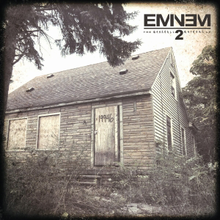Marshall Arts
A review of Eminem’s latest album

2010 saw Eminem release Recovery, his seventh studio album. The album received good-but-not great reception, thanks in part to the album’s massively successful singles, such as “Not Afraid,” “Love the Way You Lie,” and “No Love.” Critics enjoyed the album, but noted the at-times weak lyricism and flow on the part of Eminem, something that plagued his previous two releases.
After three years of speculation about a new album, Eminem finally announced and released The Marshall Mathers LP 2, a sequel to 2000’s The Marshall Mathers LP, now a landmark hip hop album. With such a title, the album carried lofty expectations.
The album starts with a bang thanks to “Bad Guy,” an opener that is a sequel to “Stan,” a song from this album’s predecessor in 2000. “Stan” was about an obsessed fan who commits suicide after feeling ignored by Eminem. “Bad Guy” is the chilling story of Stan’s younger brother Matthew, seeking revenge against Eminem for perceived abandonment in the wake of his brother’s death, ultimately kidnapping him. Eventually, Eminem begins rapping from his own perspective, noting that Matthew is symbolic of age catching up to him, hypocrisy in his music and way of life, and the realization that this is his last chance to make a meaningful release. This gripping work is a career highlight for Eminem because of its storytelling, something Eminem has lacked for several years now.
After “Bad Guy,” and a brief skit, Eminem has three songs of varying results. The first, “Rhyme or Reason,” discusses his father abandoning his family with a good flow, but middling lyrics. What follows is “So Much Better,” an excellent, angry track that finally sees Eminem bring back the “Slim Shady” persona. Comical but violent, it features top notch wordplay and flow. Next is “Survival,” a disappointing single featuring Liz Rodrigues. An obnoxious arena rock beat, combined with weak lyrics and a cringeworthy flow that demonstrates Eminem trying to rhyme ‘toolboxes’ with ‘screwdrivers,’ this song is a weak attempt at replicating an anthem like 2002’s “Till I Collapse.”
The album gets back on track in “Legacy,” where Eminem utilizes masterful storytelling to discuss being bullied and using rap as an outlet and ultimately becoming famous. This lyrically superb track is followed by “A**hole,” in which Eminem muses about his confrontational, bullying approach to his music, utilizing superior wordplay and flow in the process to do so. Another great song, it features a catchy hook by Skylar Grey and an epic drum beat.
The subsequent track, “Berzerk,” is average. Featuring a rock sampled beat, Eminem pays tribute to the Beastie Boys. Though the lyrics and flow are average, that is sort of the point, as classic rap was average in this regard. The track grows on you…but it takes a while.
What follows is the jaw-dropping “Rap God,” where Eminem discusses how he went from idolizing rappers like Tupac Shakur and Dr. Dre to being a “Rap God,” and the best rapper of his time. The song has an unbelievable flow, with brilliant wordplay. It even features a brief verse where Eminem raps an average of 6.5 words a second, making this an album highlight, along with “Bad Guy.” “Brainless,” follows, with Eminem once again rapping as Slim Shady over a beat that could have been found on the original Marshall Mathers LP. Talking about all of his problems, from haters, rivalries with other rap acts, and mental issues, Eminem’s lyricism and wordplay are impeccable. This is the third album highlight in an already-strong album. Of course, Eminem proceeds to blow it by singing on the next track, “Stronger Than I Was,” and the song after that, “The Monster,” featuring Rihanna, has some of his weakest verses on the album, and is actually better suited for Rihanna due to its pop-influence.
The final four tracks are diverse. Eminem raps about his poor upbringing and old age with a comical twist on the album’s funniest song, “So Far…” The next song, “Love Game,” featuring Kendrick Lamar, discusses his failures with women, again with a comical focus. “Headlights” is the album’s fourth and final highlight. Featuring Nate Ruess, it is a tearjerker of an apology to his mother, who he attacked in previous songs for poor parenting. Ending the album is “Evil Twin,” with Eminem talking about the two sides of his personality: Marshall Mathers and Slim Shady. All four of these tracks have either excellent storytelling, flow, wordplay, and lyricism, making it the most consistent part of the album.
This album, on which each track adds to the narrative that is the life of Eminem, earns a strong 8/10 and ranks in at his fourth best album, behind The Marshall Mathers LP, The Eminem Show, and The Slim Shady LP. Eminem’s technical ability really came out on this album, with flawless storytelling, superior lyrics and wordplay, and a flow that may actually be the best it’s ever been. There are lapses on a few songs and where these occur, it’s bad…very bad, which is enough to knock off two points. However, Eminem quickly recovers with another defiant piece. Easily the best mainstream hip hop release of 2013 given flops by Jay Z and Kanye West, this album merits purchase in its entirety.

